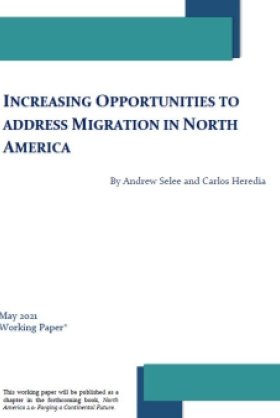Increasing Opportunities to Address Migration in North America





This policy brief presents a few ideas of how to build cooperation from the ground up, around discrete and useful areas of possible collaboration, in a way that one day could lead to a more comprehensive North American labor mobility and migration agenda. Mobility is defined here as the temporary movement of labor from one region to another—keeping permanent residence in the home country—while migration implies the movement of labor with a simultaneous change of residence. There are clear advantages for the competitiveness of all three countries in generating a common agenda around mobility and migration, but it is less clear when this will become realistically possible. In the meantime, small steps could serve as meaningful building blocks for future cooperation.
This policy brief is part of our series "North America 2.0: Forging a Continental Future". The policy briefs will be released individually and published as a volume in 2021.



The Mexico Institute seeks to improve understanding, communication, and cooperation between Mexico and the United States by promoting original research, encouraging public discussion, and proposing policy options for enhancing the bilateral relationship. A binational Advisory Board, chaired by Luis Téllez and Earl Anthony Wayne, oversees the work of the Mexico Institute. Read more


The mission of the Wilson Center's Canada Institute is to raise the level of knowledge of Canada in the United States, particularly within the Washington, DC policy community. Research projects, initiatives, podcasts, and publications cover contemporary Canada, US-Canadian relations, North American political economy, and Canada's global role as it intersects with US national interests. Read more
